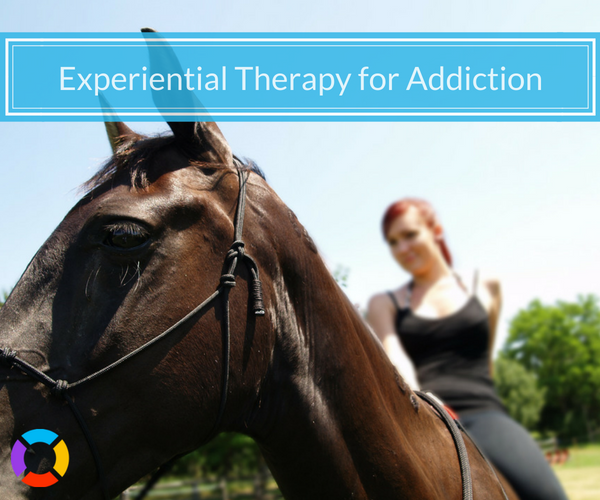Experiential Therapies Explained & Find Your Best Fit [Quiz]

Experiential therapy is a treatment modality that incorporates expressive tools and activities into the treatment process. It includes a range of hands-on approaches like wilderness therapy, animal therapy, EMDR, art therapy and recreational therapy.
The purpose is to give you the chance to reenact and experience emotional situations from your past.
Experiential therapies such as EMDR have been well studied and found to be highly beneficial. Others, such as wilderness or adventure therapy have limited or mixed evidence showing their effectiveness in treating addiction.
Experiential therapy should not be used alone but as adjunct treatment and should always be performed under the guidance of trained professionals within a structured program.
This guide will give more explanation on what experiential therapy is, the different therapy types, benefits and who is the ideal candidate for each of the types.
Take our Which Experiential Therapy is Right For You quiz.
What Is Experiential Therapy?
Experiential therapy is an activity based approach to addiction and mental health recovery. The purpose is to focus on the activities that help identify the emotions associated with success, disappointment, responsibility and self-esteem.
It also gives you the opportunity to explore and learn to cope with feelings of anger, hurt or shame associated with past experiences.
Definition & Core Philosophy
The core philosophy of experiential therapy is “healing by doing.” It focuses on the here and now to help you address your mental health concerns and addiction. This therapy operates on the belief that you have the capacity for self determination and personal growth.
This is different from talk therapy because it gives you the chance to address your emotions and your body’s responses through activities rather than just talking about them.
How Experiential Therapy Works in Recovery
Experiential therapy uses hands on activities like art, role playing or outdoor challenges to help you uncover emotions that may be difficult to express in traditional talk therapy.
These activities encourage healthier self expression and build problem solving skills. Experiential therapy is often integrated into substance abuse counseling and holistic addiction treatment programs, providing you with practical tools for emotional growth and long term recovery.
Curious about experimental therapy? Call today for answers.
Types of Experiential Therapy in Addiction Treatment
Experiential therapy is a form of treatment that uses activities such as role playing, art, music or outdoor challenges to help you explore emotions and behaviors in real time.
In mental health and substance use disorder (SUD) care, it supports healing by allowing you to process difficult experiences and develop healthier coping strategies by actively participating rather than traditional talk therapy.
Wilderness Therapy
What Is Wilderness Therapy?
Wilderness therapy combines outdoor experiences with adventure based therapy sessions. These sessions often involved learning different survival skills, engaging in teamwork, and immersing yourself in nature.
Approach & Benefits
Wilderness therapy builds resilience and accountability with peer support. This also helps you learn to manage emotions, strengthen your relationships and build confidence.
Using wilderness therapy in addiction treatment helps promote mindfulness practices and gives you a place to therapeutically address your fears. It also complements traditional models such as Cognitive Behavioral Therapy (CBT) so you can use what you’ve learned for better outcomes.
Who Is Wilderness Therapy Good For?
Wilderness therapy provides a change of scenery, giving you a much needed break from a toxic environment.
It also promotes positive connections to peers and provides a unique environment where you can explore the benefits of therapy when you may be resistant to talk therapy. This environment may be particularly helpful for teenagers with behavioral issues or those who are at risk.
Animal Assisted Therapy (Equine & Beyond)
What Is Animal Therapy?
Animal therapy uses animals, especially horses, in recovery programs to help you cope with emotional distress associated with addiction and mental health issues. Meaningful interactions with animals help foster trust, reduce anxiety and encourage emotional healing.
Approach & Benefits
Animal therapy encourages you to bond with the animals, building trust and empathy while teaching you responsibility. Equine therapy in substance use programs promote improved emotional regulation, self-efficacy, and self-esteem.
Who Is Animal Therapy Good For?
If you have a history of trauma, struggle to trust others, or difficulty expressing emotions animal assisted therapy may be a good option. This treatment modality, when used as an adjunct therapy, can be especially helpful for teenagers and adults.
Art Therapy for Recovery
What Is Art Therapy?
Art therapy for addiction recovery uses creative expression to process your emotions surrounding substance use.
Art therapy can include but is not limited to painting, music, acting or sculpting. Realistically, any creative expression can fall into this category. Always remember that art therapy should be guided by a trained art therapist.
Approach & Benefits
Art therapy provides a creative outlet to express emotions that may be difficult to put into words.
Through artistic activities, you can process past experiences, reduce stress and gain new perspectives on your recovery. This approach not only supports emotional healing but also builds coping skills and fosters self discovery in a safe, supportive environment.
Who Is Art Therapy Good For?
Art therapy is an effective tool for adults who have an extensive history of trauma or long term substance use. It can also help adolescents and adults who are resistant to traditional counseling and have a difficult time expressing their thoughts and feelings through words.
Recreational Therapy
What Is Recreational Therapy?
Recreational therapy is an activity based intervention that incorporates structured activities such as ropes courses, climbing, hiking and team challenges. It improves physical, cognitive and emotional wellbeing.
Approach & Benefits
Recreational activities used for substance use can be both physical and mindfulness based on improving mood, discipline and teamwork. This allows programs to incorporate therapy with teamwork and a peer support component, providing a positive influence on your treatment journey.
Who Is Recreational Therapy Good For?
Recreational therapy is effective for adults seeking or needing more physical challenges to engage in treatment. It can also be helpful for teenagers who are resistant to traditional talk therapy and need additional methods to support their mental health.
EMDR (Eye Movement Desensitization and Reprocessing)
What Is EMDR Therapy?
Eye Movement Desensitization and Reprocessing (EMDR) focuses on alleviating distress associated with traumatic memories, using visual stimulation and eye movement. It is often used in addiction treatment to help you process underlying trauma that may contribute to substance use.
Approach & Benefits
EMDR helps address trauma that has triggered addiction, targeting the negative memory or belief that causes your substance use issues. EMDR can reduce symptoms of PTSD and stress, helping you learn how to positively cope with emotional triggers.
Who Is EMDR Good For?
EMDR can be effective in adolescents and adults when you are dealing with co occurring disorders such as substance use disorder and PTSD, phobias, anxiety and depression to name a few. EMDR is also effective in addressing the effects of trauma.
Adventure Therapy (Extreme & Experiential)
What Is Adventure Therapy?
Adventure therapy uses high intensity outdoor and experiential activities, such as hiking, rock climbing or team challenges. These encourage personal growth and emotional healing. It is typically facilitated by trained professionals in structured, supervised settings.
Approach & Benefits
Adventure Therapy helps you build resilience, develop trust and strengthen problem solving skills. It provides opportunities for leadership which can help build confidence. You may notice improvement in your self esteem with a growing sense of responsibility.
Who Is Adventure Therapy Good For?
Teenagers and young adults with behavioral issues can benefit from adventure therapy. Adults dealing with low self esteem or confidence may consider adventure therapy to build self awareness and develop healthier ways of interacting with others.
Other Experiential Therapy Approaches
Group Based Experiential Techniques
Other forms of experiential therapy can be used for trauma and substance use such as seeking safety groups and peer focused therapy interventions. These approaches emphasize shared experiences and mutual support within a structured group setting.
Who They’re Good For
These approaches can be good when you are dealing with co occurring disorders and need structured support groups.
Discover Your Best Therapy Match in 2 Minutes
Benefits of Experiential Therapy for Addiction Recovery
Experiential therapy offers a powerful way to break through barriers that can make recovery feel overwhelming. It encourages self expression and open communication, helping you process emotions that might be difficult to articulate in traditional talk therapy.
Along the way, you develop stronger connections with your peers, creating a supportive community that reinforces lasting recovery. This approach equips you with healthier coping strategies to replace destructive patterns that are tied to addiction.
Over time, experiential therapy can improve your confidence, resilience and ability to navigate real world challenges without turning back to substances.
Risks, Criticisms, and Considerations
As with any type of treatment, there are risks and criticism associated with it. Experiential therapy carries criticism of healing vs. risks.
While it is praised for its potential to promote healing and emotional growth, it is also criticized for the risks that may include the intensity of emotions it brings up, the possibility of re-traumatization or concerns about safety and regulation in activities like outdoor challenges or role playing.
Other considerations are the cost of treatment, accessibility of programs, and whether the program is accredited with licensed therapists before incorporating this type of treatment into your recovery journey.
How Experiential Therapy Fits into Addiction Treatment Programs
Experiential therapy may be combined with substance use counseling or treatment programs in addition to other evidence based treatments. The nature of therapy makes it most effective in holistic addiction treatment centers.
Experiential therapy can be integrated with counseling, group therapy and other evidence based approaches to create a well rounded treatment plan. By engaging both the mind and body, it adds depth to recovery programs and supports a more comprehensive path to healing.
FAQs About Experiential Therapy
There are many types of activities used in experiential therapy. These can include horseback riding, drawing, dancing, zip lining, painting, hiking, canoeing and role playing. All of which should be used within a structured therapeutic framework.
The length of the program depends on the setting, such as outpatient or inpatient programs.
In an outpatient setting, you could engage in activities on a monthly or weekly basis. For inpatient treatment, you may receive far more intensive treatment and engage in some form of experiential therapy multiple times each week.
Yes, experiential therapy can be effective for teenagers. It can be especially beneficial for teenagers with behavioral issues or resistant to other forms of treatment.
Adventure therapy interventions can work as an alternative or as a complementary therapeutic tool to traditional addiction recovery counseling, producing positive intrapersonal and interpersonal outcomes.
Is Experiential Therapy Right for You?
You and your mental health professional can choose from several types of experiential therapy to address your behavior patterns or past trauma. Each incorporates different strategies, going well beyond traditional talk therapy. These strategies allow you the opportunity to try something new or express yourself in a new way.
Experiential therapy provides you with opportunities to try new activities and discover healthier ways to manage emotions and relationships.
Connect with a treatment center that offers experiential therapy programs with a holistic approach to your addiction treatment. A supportive team can guide you through these experiences in a safe and structured environment.
Take the “Which Experiential Therapy is Right for Me?” quiz today and discover the different therapeutic approaches that can make a difference in your life and your future.


